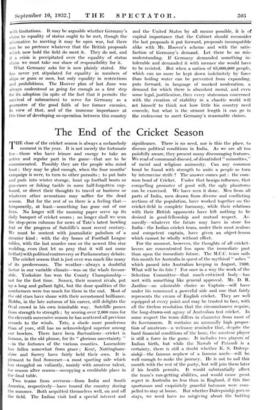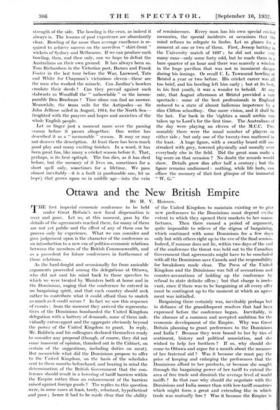The End of the Cricket Season
THE close of the cricket season is always a melancholy moment in the year. It is not merely the fortunate few—those who have leisure and energy to take an active and regular part in the game—that are to be commiserated. Possibly they are the people who mind least ; they may be glad enough, when the four months' campaign is over, to turn to other pursuits ; to put bats and pads into winter storage, hunt up football boots or gun-cases or fishing tackle in some half-forgotten cup- board, or direct their thoughts to travel or business or whatever other avocations may suffice for the dead season. But for the rest of us there is a feeling that— temporarily, at least—something has gone out of our lives. No longer will the morning paper serve up its daily banquet of cricket scores ; no longer shall 'we scan the stop-press columns for news of Tate's latest bowling feat or the progress of Sutcliffe's most recent century. We must be content with journalistic pabulum of a drearier kind : with the dry bones of Football League tables, with the last murder case or the newest film star wedding, even (but let us pray that it will not come to that) with political controversy or Parliamentary debate.
The cricket season that is just over was much like many of its predecessors. The weather—always a doubtful factor in our variable climate—was on the whole favour- able. Yorkshire has won the County Championship— not for the first time. Sussex, their nearest rivals, put up a long and gallant fight, but the dour qualities of the northerners were too much for them in the end. Most of the old stars have shone with their accustomed brilliance. Hobbs, in the late autumn of his career, still delights the Oval crowd in his own inimitable way. Sutcliffe passes from strength to strength ; by scoring over 2,000 runs for the eleventh successive season he has scattered all previous records to the winds. Tate, a shade more ponderous than of yore, still has no acknowledged superior among our bowlers. There have been fluctuations—cricket is famous, in the old phrase, for its "glorious uncertainty " —in the fortunes of the various counties. Lancashire has fallen somewhat from grace ; Kent, Nottingham- shire and Surrey have fairly held their own. It is pleasant to find Somerset—a most sporting side which has struggled on valiantly, mainly with amateur talent, for season after season--occupying a creditable place in the final table.
Two teams from overseas—from India and South America, respectively—have toured the country during the summer. Both acquitted themselves well, on and off the field. The Indian visit had a special interest and significance. There is no need, nor is this the place, to discuss political conditions in India. As we are all too painfully aware, they present many discouraging features. We read of communal discord, of dissatisfied "minorities," of racial and religious animosity. Can any common bond be found with strength to unite a people so torn by internecine strife ? The answer comes pat : the com- mon bond of Cricket. Under that benign influence, that compelling promoter of good will, the ugly phantoms can be exorcised. We have seen it done. Men from all parts of India, men drawn from diverse and conflicting sections of the population, have worked together on the cricket-field in complete harmony, while their relations with their British opponents have left nothing to be desired in good-fellowship and mutual respect. As- suredly—whatever the future may have in store for India—the Indian cricket team, under their most zealous and competent captain, have given an object-lesson which cannot be wholly without effect.
For the moment, however, the thoughts of all cricket- lovers are concentrated less upon the immediate past than upon the immediate future. The M.C.C. team sails this month for Australia in quest of the mythical" ashes" which passed into Australian keeping in August, 1980. What will be its fate ? For once in a way the work of the Selection Committee—that much-criticized body—has met with something like general approval. Mr. D. R. Jardine—an admirable choice as Captain—will have under his command a powerful side and one that fairly represents the cream of English cricket. They are well equipped at every point and may be trusted to face, with all the tireless resolution that the circumstances require, the long-drawn-out agony of Australian test cricket. In some respect the team differs in character from most of its forerunners. It contains an unusually high propor- tion of amateurs—a welcome reminder that, despite the hard financial conditions of the hour, the amateur player is still a force in the game. It includes two players of Indian birth, but while the Nawab of Pataudi is a certainty, there is still a doubt whether K. S. Duleep- sinhji—the famous nephew of a famous uncle--will be well enough to make the journey. He is not to sail this month with the rest of the party, but will join them later if his health permits. It would substantially affect the team's run-getting abilities, and would cause great regret in Australia no less than in England, if this fine sportsman and exquisitely graceful batsman were com- pelled to stay at home. But whether Duleepsinhji goes or stays, we need have no misgiving about the batting strength of the side. The bowling is the crux, as indeed it always is. The lessons of past experience are abundantly clear. Bowling of far more than average excellence is re- quired to achieve success on the merciless " shirt-front " wickets of Sydney and Melbourne. If we can produce such bowling, then, and then only, can we hope to defeat the Australians on their own ground. It has always been so. Tom Richardson in the Victorian past, Barnes and Frank Foster in the last tour before the War, Larwood, Tate and White for Chapman's victorious eleven—these are the men who worked the miracle. Can Jardine's bowlers emulate their deeds ? Can they prevail against such stalwarts as Woodfull the " unbowlable " or the incom- parable Don Bradman ? Time alone can find an answer. Meanwhile, the team sails for the Antipodes—as Sir John Jellicoe sailed in August, 1914, for the North Sea— freighted with the prayers and hopes and anxieties of the whole English people.
Let us linger just a moment more over the passing season before it passes altogether. One writer has described it as a " memorable " season. It may or may not deserve the description. At least there has been much good play and many exciting finishes. In a word, it has been great fun, like many a cricket season before it. That, perhaps, is its best epitaph. The fun dies, as it has died before, but the memory of it lives on, sometimes for a short spell only, sometimes for a lifetime. We pass almost inevitably—it is a fault (a pardonable one, let us hope) that grows upon us in middle age—into the vein of reminiscence. Every man, has his own special cricket memories, the speeial incidents or occasions that the mind refuses to relegate to limbo. Let us glance for a moment at one or two of them. First, Jessop batting in the University match of 1897; he did not make very many runs—only some forty odd, but he made them in a bare quarter of an hour and there was scarcely a window in the huge pavilion that was not in imminent danger during his innings. Or recall C. L. Townsend bowling at Bristol a year or two before. His cricket career was all too brief, and his bowling left him early ; but at its best, in his first youth, it was a wonder to behold. At any rate, that August afternoon at Bristol provided a rare spectacle : some of the best professionals in England reduced to a state of almost ludicrous impotence by a slim Clifton schoolboy. One more vision, and it shall be the last. Far back in the 'eighties a small urchin was taken up to Lord's for, the first time. The Australians of the day were playing. an eleven of the M.C.C. Pre- sumably there were the usual number of players on either side ; but only one of the twenty-two mattered in the least. A huge figure, with a swarthy beard still un- streaked with grey, towered physically and morally over everybody else in the field. Did the great man make a big score on that occasion ? No doubt the records would show. Details grow dim after half a century ; but the figure remains undimmed : nothing, while life lasts, can efface the memory of that first glimpse of the immortal
64.































 Previous page
Previous page